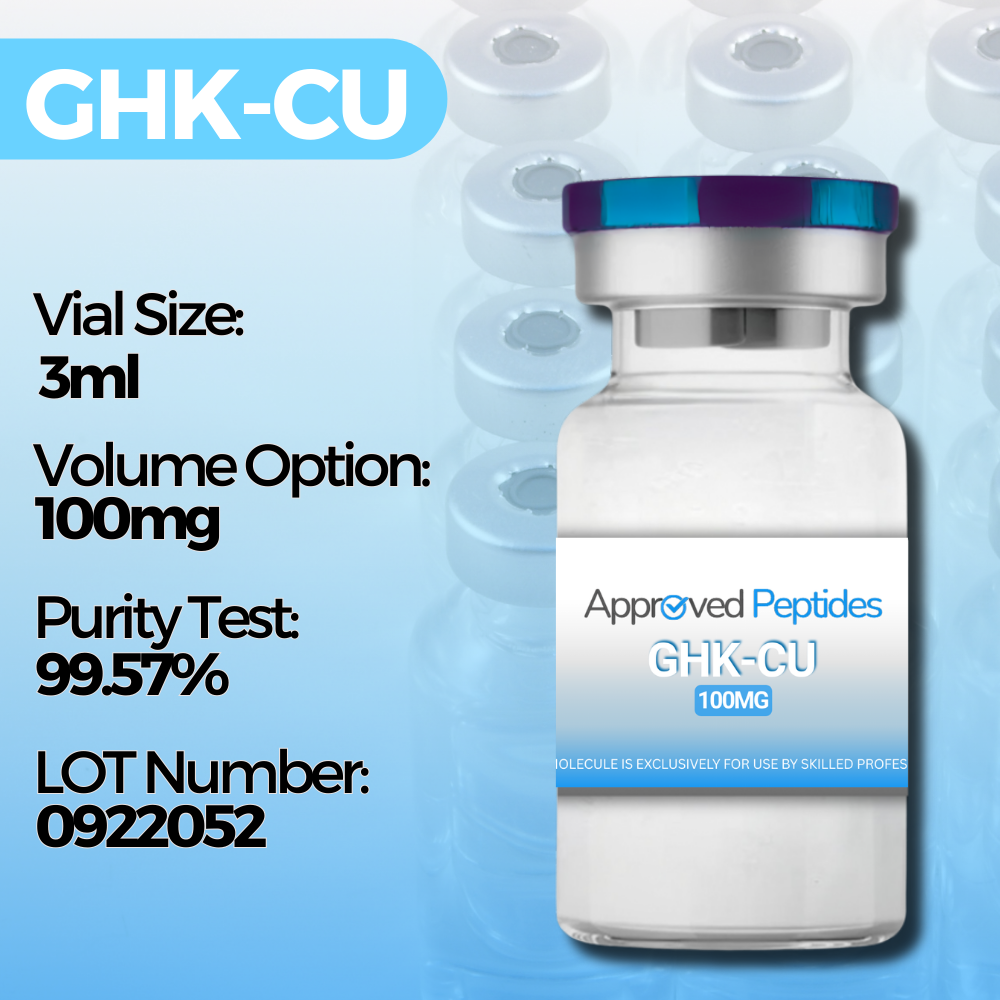Approved Peptides are intended for licensed medical professionals and experienced researchers. Reconstitution required. Dosing and use instructions are not provided.
GHK-CU
GHK-CU
Couldn't load pickup availability
GHK-Cu (Copper Tripeptide) – Research Peptide Review
Discovery and Background
GHK-Cu (Glycyl-L-Histidyl-L-Lysine-Cu²⁺) was first identified in human plasma in the 1970s by Dr. Loren Pickart. Researchers quickly discovered that this naturally occurring copper-binding tripeptide possessed remarkable regenerative potential — stimulating tissue repair, skin remodeling, and cellular protection.
Because GHK-Cu declines significantly with age, its restoration has been of great interest in research on wound healing, cosmetic rejuvenation, and anti-aging applications. It is sometimes referred to as the “youth peptide” for its ability to reawaken dormant repair processes in experimental models.
Research Applications and Benefits
GHK-Cu has been the subject of decades of study, with promising findings across multiple areas:
-
Skin Regeneration & Anti-Aging
Research shows GHK-Cu can stimulate collagen, elastin, and glycosaminoglycan production, helping restore skin firmness, elasticity, and thickness. -
Wound Healing
GHK-Cu promotes angiogenesis and cellular migration, accelerating wound closure and tissue remodeling in laboratory studies. -
Hair Growth
Studies suggest that GHK-Cu can stimulate hair follicle activity, extending the anagen (growth) phase and supporting new hair development. -
Anti-Inflammatory & Antioxidant Effects
By modulating gene expression, GHK-Cu reduces oxidative stress and inflammation while enhancing DNA repair and cellular detoxification pathways. -
Neuroprotection
Preclinical research has highlighted GHK-Cu’s potential to support nerve regeneration and protect against neurodegenerative changes.
As with all peptides, GHK-Cu is provided strictly for research purposes only and is not approved for human consumption or therapeutic use.
- Formulation Stability – Provided in lyophilized form for stability. For cosmetic research, its ability to penetrate the skin barrier is enhanced when properly formulated.
- Regulatory Status – GHK-Cu is widely used in cosmetics and topical preparations, but as a peptide it remains investigational and is not FDA-approved as a medical treatment.
- Research Use Only – GHK-Cu must be studied under controlled conditions with strict adherence to regulatory standards.
GHK-Cu represents one of the most well-documented regenerative peptides, with a broad range of applications in skin rejuvenation, hair growth, wound repair, and cellular protection. Its decline with age makes it a compelling target for research in anti-aging and cosmetic science.
For researchers, GHK-Cu offers a valuable tool to explore how restoring natural repair pathways can influence healing, resilience, and youthful tissue function.
Share


